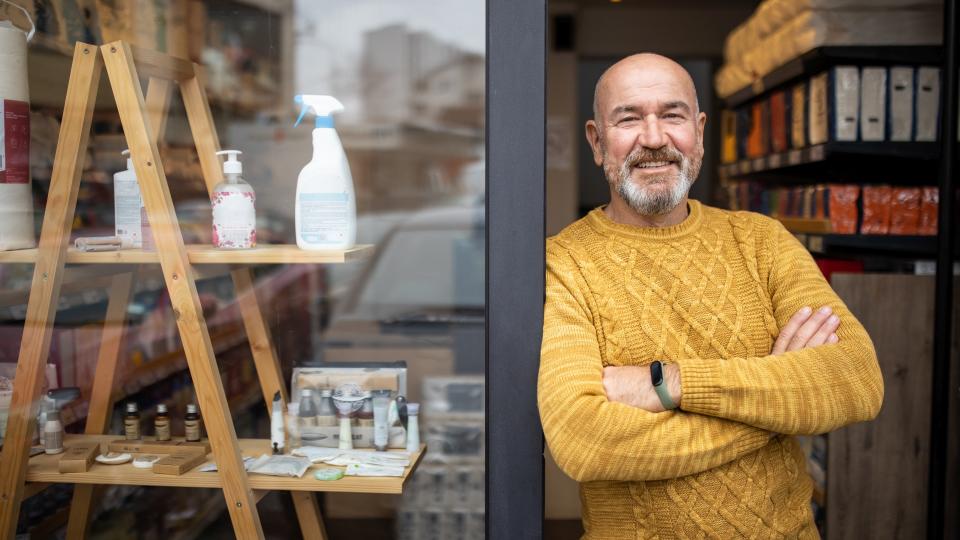How Much Experts Say You Should Have in Your Savings Account Before You Start Your Own Business

You’ve decided you want to start a business. That’s great — being an entrepreneur can be an exciting and rewarding experience, but it also comes with its own set of challenges and risks.
Make Money With AI and Chat GPT: How To Earn $1,000 a Month
Read More: How To Build Your Savings From Scratch
One of the biggest challenges is determining how much money you need to start your business and how much savings you should have before taking the plunge. While there’s no one-size-fits-all answer to this question, there are a few factors to consider when determining how much money you need to get started.
You Need an Emergency Fund
It’s critical to have enough savings to cover your living expenses while your business is just starting out. You’ll need to be able to pay your rent or mortgage, buy groceries and gas, and take care of utility bills and other necessary expenses.
Certified Financial Planner and author of Financial Fives, Gary Grewal, said “You don’t want to rely on your business for income right away. It needs time to get established and grow in order to be sustainable and successful.”
So how much do you need for your emergency fund?
“At the bare minimum, you should have an emergency fund with three to six months’ worth of living expenses before starting a business. If possible, having six to twelve months of emergency savings is recommended,” said Akpan Ukeme, CFP and founder of Finance4Zoomers.
While this may seem like a lot of money, it’s important to remember that starting a business can be unpredictable, and it may take some time before your business starts generating a steady income.
Take Our Poll: Are You Concerned About the Safety of Your Money in Your Bank Accounts?
Get Your Personal Finances in Order
Another factor to consider when determining how much savings you should have before starting a business is your personal financial condition.
Kahlil Dumas, financial advisor and founder of UNSTUCKKD, said, “If you are struggling financially with high-interest debt, paying it off should be a top priority before starting a business.”
He also emphasized the importance of clearly understanding your finances, including debt and financial obligations. “Having a separate business bank account and business credit card is crucial to managing finances and establishing good credit,” Dumas continued. “Achieving a credit score of 700 or higher is an excellent start to building a strong financial foundation.”
Consider Starting Your Business Part-Time
Whether or not this is an option will depend on the type of business you’re planning to start, but this tactic will give you much more flexibility on the amount of savings needed.
“From my experience of starting several businesses, I’ve found that the best approach is to start as a side hustle, while you still have other sources of income to finance your personal expenses. This can give you the time to test the waters and make better decisions without feeling the pressure of relying solely on the business to support you,” said Luciano Colos, founder and CEO of PitchGrade.
Obviously, this isn’t going to work very well for a brick-and-mortar business, but if your business will be largely online or is based on providing a service like consulting, taking the part-time route.
Figure Out Your Startup Expenses
Before you start your business, it’s important to create a detailed budget that outlines all of the expenses you’ll incur during the startup phase. This budget should include everything from the cost of registering your business and purchasing equipment to the amount of money you will need to pay for marketing and advertising. Once you have an understanding of how much money you will need to get your business off the ground, you can start to determine how much you should have saved before you start.
“The assumption that small businesses require significant savings/funding to be successful is a common misconception – and one that often keeps budding entrepreneurs from taking a leap of faith and starting their own business.,” said Geoff Clawson, Vice President of Product for GoDaddy.
“The truth is investment varies by the type and nature of the business – is it brick and mortar, online, or both? Does your business model require you to buy and store inventory? Or are you solely a digital brand, like selling digital assets on Etsy or even local services like tutoring or babysitting?”
It’s also important to consider the industry you plan to enter and the level of competition in that industry. If you plan to start a business in a highly competitive industry, you may need to invest more money in marketing and advertising to stand out from your competitors. This means that you may need to have more in savings before starting your business to cover these additional expenses.
Once you’ve done the work upfront, you may actually find that you actually need less money than you thought to get started. “In fact, GoDaddy data shows that more than half of small businesses are launched with less than $5,000,” Clawson added.
Truthfully, there’s no set amount of savings that’s required before starting a business, and there will always be some risk and uncertainty involved — but taking the time to fully understand your own financial situation and the needs of your specific business will give you a much better chance of making it until your new business can fully replace your income.
More From GOBankingRates
This article originally appeared on GOBankingRates.com: How Much Experts Say You Should Have in Your Savings Account Before You Start Your Own Business
